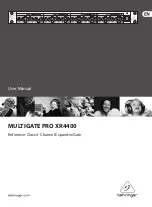
12
MULTIGATE PRO XR4400 User Manual
Adjust all controls and switches to the following basic settings:
Control elements
Position
MONITOR switch
OUT
SC FILTER switch
OUT
THRESHOLD switch
fully clockwise
HOLD control
center position
RELEASE control
center position
MODE switch
GATE
RANGE/RATIO control
fully counter-clockwise
Tab. 6.1: Initial settings of the MULTIGATE PRO
THRESHOLD control
Now turn the THRESHOLD control counter-clockwise until the lowest signal
delivered by the instrument you wish to record triggers the expander and is
reproduced without any sound deterioration. The “+” LED lights up as soon as
the expander is triggered. When everything’s set up properly, you will hear the
instrument clearly “stand out” against the overall sound image.
HOLD control (available in GATE mode only)
The program material (e.g. speech/vocal recordings) often contains many and
sometimes very short signal pauses, which could switch the gate off and back on
over and again. The hold function prevents this annoying “flutter” effect known
from conventional designs, simply by delaying the starting point of the release
process. Thus, the gate remains on during short signal pauses. When the adjusted
hold time has expired, the gate closes the audio channel depending on how the
release function has been set.
◊
Please note that this control can be used in gate mode only!
RELEASE control (available in GATE mode only)
Many percussion instruments have long decay times (e.g. cymbals). As the release
time can be adjusted on the MULTIGATE PRO, the device allows you to follow the
decay curve of the instrument so that its overall sound character will be retained.
In this way, you can avoid that short release times affect the natural decay phase
of the instrument or its corresponding reverb ambiance.
Slowly decaying or heavily reverberated signals are best processed with long
release times. You will note that with most drum sounds a short release time
should be used for the sake of acoustic separation, while longer release times are
usually better for cymbals and tom-toms.
Once all control elements have been set properly, your percussion sounds will be
“dry”, “powerful” and acoustically well-defined.
◊
Please note that this control can be used in gate mode only!
RANGE control
The RANGE control determines the amount of maximum attenuation of the
audio signal. When you process instruments with long decay times, it will
be helpful to set the RANGE control to mid-travel position, so that the signal
will not be suppressed completely. Although the MULTIGATE PRO allows for a
maximum gain reduction of 80 dB, it is usually not useful to reduce the signal
level by this maximum amount. In particular, with highly noise-affected signals
we recommend that you use a signal attenuation of not more than 10 to 20 dB,
so that the onset of the gate function will not become too obvious.
6.1.2 The expander function
In contrast to the gate function, the expander triggers a continuous attenuation
of the signal, as soon as it has dropped below the threshold.
RATIO control
With the MODE switch in, the MULTIGATE PRO works as an interactive expander.
The RATIO control determines the expansion curve. For example, when a piece
of music was highly compressed during the recording session, the lost dynamics
can be restored through complementary expansion. With a bit of feeling you
can set the following controls by ear so that the original dynamics (prior to the
compression process) will be restored.
We recommend that you set the RATIO control to about 1:1.2 through 1:2 to allow
for a “smooth” expansion curve, and that you adjust the THRESHOLD control so
that the entire dynamic range of the music piece will be below the threshold
point. Now set the THRESHOLD control so that only the loudest passages of the
program material surpass the threshold point (“-” LED flashes). In the same way,
you can artificially expand the dynamic range of any instrument. In particular,
when processing sampled sounds, expansion can produce nice results,
because samplers usually have a highly limited dynamic range. When processing
percussion sounds (e.g. snare drum) you can use downward expansion to create
interesting effects, for example, by setting the threshold to about mid-position,
so that only the “lower” part of the dynamics will be processed: the signal decays
unchanged until the adjusted threshold is reached, and any subsequent signal
portions are faded out with increasing attenuation.
6.2 Proper positioning of microphones
The main task of an expander is to separate unwanted background noise from the
actual signal and to eliminate this noise “inaudibly”. Understandably, there must
be a minimum difference in the levels of wanted signal and interference signal,
so as to be able to define a threshold point for the expander.
However, the optimum operation of an expander depends on the proper choice
and positioning of the microphones:
Be extremely careful when instruments with high-frequency portions are played
to the sides or back of a microphone with a cardioid polar pattern. Most room
microphones suffer from a deterioration of their directivity when picking up
high frequencies. For example, with a sensitivity difference of not more than
2-3 dB around 5-10 kHz between the main and lateral axes, cymbals can produce
enormous crosstalk in tom-tom microphones, or the hi-hats can mask the sound
of the snare drum.
You should make optimum use of the specific directivity of a microphone to
acoustically separate other instruments as perfectly as possible. Do as best as
you can to separate the sound sources acoustically simply by positioning the
microphones correctly.
Yet, in some applications even perfectly positioned microphones might
not produce satisfying results. With its side-chain function the BEHRINGER
MULTIGATE PRO gives you the option of frequency-selective expansion and thus
another aid to ensure perfect acoustic separation of the sound sources.

































